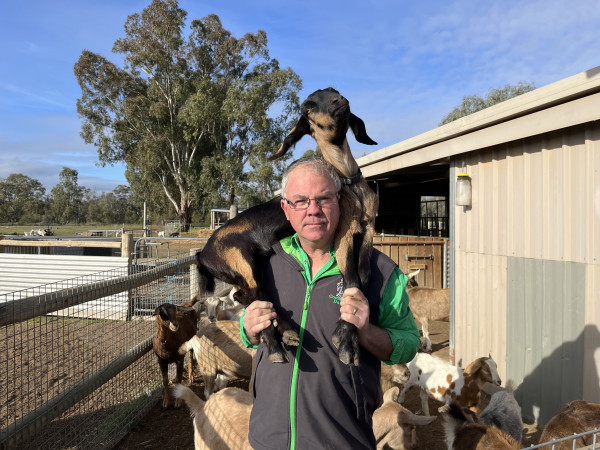COOMEALLA farmer Dean Kitto-Trickey says it’s taken him the better part of a decade to build a goat herd capable of providing commercial production for his dairy business.
But he fears he may soon lose it all, believing foot and mouth disease could follow in the footsteps of COVID-19 and enter the country despite the federal government’s efforts to prevent its spread.
The goat farmer, who has a herd of 250 goats to produce milk, cheese and soap products, said he was prepared to close his doors to tourists and visitors in a bid to save his animals.
“This is just another disease that’s going to eventually come to Australia,” Mr Kitto-Trickey said. “If that happens, we will just close the doors and not let anybody come onto the property.
“It’s taken me eight years to build up my herd to the point I can call it commercial. If I’m gonna replace 250 goats at say $500 a head, that’s a lot of money.”
Mr Kitto-Trickey, a former carpenter who grew up milking goats in Robinvale, said the prospect of having to put his stock down would be “devastating”.
“(My stock) are all in the paddock having babies right now,” he said. “We’ve just had a set of twins and a set of triplets.
“It’s terrible. You love your animals.”
While it does not pose a threat to human health, FMD is a highly contagious disease affecting domestic and wild cloven-hoofed animals such as cattle, sheep, goats and pigs.
The disease, which is spread in expired air and secretions, is seen in blisters and erosions in the mouth, nostrils and on the skin between and above the hoofs.
In the 2001 outbreak in the United Kingdom, over six million sheep and cattle were killed to stop the spread of the disease.
Indonesian authorities confirmed over 60 cases of Foot and Mouth Disease in Bali in early July.
Viral fragments of the disease have been found in pork products in Melbourne and since been removed, but no cases of the disease have yet been found in Australia.
The Australian government has responded to the threat to the $80 billion agriculture industry by rolling out new biosecurity measures at international airports last weekend. This includes the requirement for travelers returning on flights from Bali to clean their shoes on arrival and walk over sanitation mats.
A Department of agriculture spokesperson said the department was increasing its capacity to question and assess passengers and a FMD specific broadcast was played before passengers disembarked from planes.
Agriculture Minister Murray Watt announced at the weekend that all mail item from Indonesia and China would be checked for infected meat products.
Opposition Leader Peter Dutton has called for further action, telling 2GB radio that borders with Indonesia should be closed due to the risk of the disease.
But the current response has received the support of the NSW and National Farmers Federations, along with the Meat and Livestock Australia.
However, the Victorian Farmers Federation is pushing for more controls and has called for a suspension of camping on riverside farmland in the state.
Mr Kitto-Trickey said he was not going to let himself get complacent with the threat at the “back door” and he has biosecurity processes in place despite being 400km from the next dairy operation.
“I get visitors (tourists) all the time. We basically ask them where they’ve been, what their background is,” he said.
“We’re not transferring our stock anymore. We’ve got a couple of places where we keep our stock (but) we’re basically keeping them all here.”
Mr Kitto-Trickey, who supported a travel ban to regions with animals infected with the disease, said the biggest mistake for anybody considering travelling to Indonesia was complacency.
“Just don’t be complacent,” he said. “If you’re going to go into farms, (if) you’re going to be in waterways … you can pick up that disease and bring it back.
“I have a friend in Colac who’s a dairy farmer who milks about 600 cows a day. He’d walk off his property if foot and mouth came to Victoria. A lot of people would give up. It’s just too hard.”
















